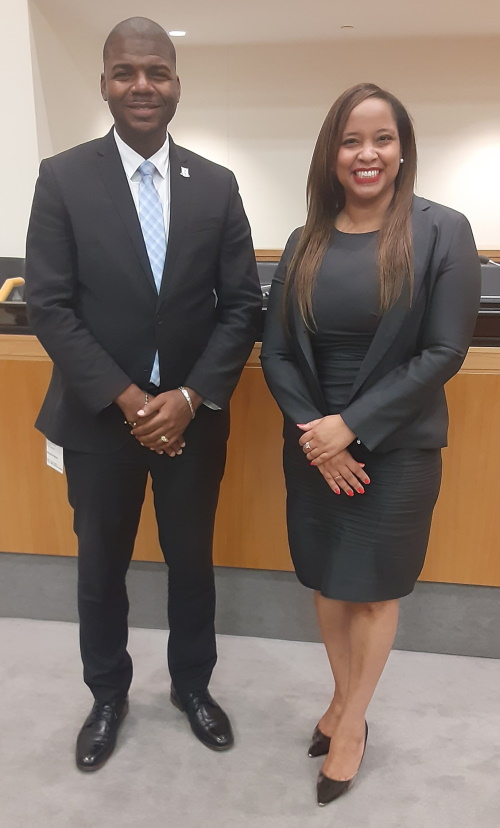 The British Virgin Islands (BVI) has received strong backing from the United Nations (UN) Special Committee on Decolonization (C-24) regarding the self-governance of the Territory and its right to self-determination at the recently concluded session of the C-24 at UN Headquarters from 14th – 25th June 2021.
The British Virgin Islands (BVI) has received strong backing from the United Nations (UN) Special Committee on Decolonization (C-24) regarding the self-governance of the Territory and its right to self-determination at the recently concluded session of the C-24 at UN Headquarters from 14th – 25th June 2021.
In addressing the question of the British Virgin Islands, the Committee heard an official statement on 14th June 2021 in New York by Dr. the Honourable Natalio D. Wheatley, BVI Deputy Premier and Minister for Education, Culture, Youth Affairs, Agriculture, and Fisheries. Hon. Wheatley updated the Committee on the BVI’s relationship with the United Kingdom (UK); development assistance provided to the BVI from within the UN system; and the impact of COVID-19 on society.
Regarding the BVI relationship with the UK, the Deputy Premier said,
“The BVI’s concerns previously expressed to this committee at the 2019 regional seminar on decolonization and June substantive session, remain valid. In some areas, the concerns are even more pronounced than before…. Our position is clear, the BVI must be allowed to exercise the maximum extent of self-governance possible under the Territory’s constitution. This was the intent of constitutional reform when the BVI and UK negotiated and agreed on the Virgin Islands Constitution Order 2007…. There seems to be a growing trend of the Governor either refusing or delaying assenting to Bills passed by the legislature for reasons other than what are conventional.”
Hon. Wheatley’s statement was staunchly supported by Antigua and Barbuda who is the current Chair of the Alliance of Small Island States (AOSIS) and incoming Chair of CARICOM. His Excellency Dr. Walton Webson, Antigua & Barbuda Permanent Representative to the UN, stressed the importance of self-governance in the BVI and upholding of the Territory’s right to self-determination. He also expressed deep concern about the Administering Power not respecting established arrangements with the BVI.
“We are concerned with the recent matters that would suggest that the Government of the United Kingdom does not always fully respect the principles of self-governance, self-determination, and the boundaries agreed upon with the longstanding arrangement between the United Kingdom Government and the British Virgin Islands,” Ambassador Webson said.
The Permanent Representative to the UN also reiterated CARICOM’s concerns about the manner in which the current UK-backed Commission of Inquiry (COI) was announced regarding whether there has been an abuse of office in the BVI, among other things. Ambassador Webson referred to the official position of CARICOM in which the Heads of Government stated that they are “dismayed at the manner in which the COI was established with no consultation, or prior communication, between the UK government and the duly-elected government of the British Virgin Islands.” In closing, Ambassador Webson called on the C-24 to dispatch a visiting mission to the BVI before the end of the year.
At the close of its June substantive session, the C-24 adopted a draft resolution on the BVI that includes, among other things, the following clauses:
“Reaffirms the inalienable right of the people of the British Virgin Islands to self-determination, in conformity with the Charter of the United Nations and with General Assembly resolution 1514 (XV), containing the Declaration on the Granting of Independence to Colonial Countries and Peoples;”
“Also reaffirms that, in the process of decolonization of the British Virgin Islands, there is no alternative to the principle of self-determination, which is also a fundamental human right, as recognized under the relevant human rights conventions;”
“Further reaffirms that it is ultimately for the people of the British Virgin Islands to determine freely their future political status in accordance with the relevant provisions of the Charter, the Declaration and the relevant resolutions of the General Assembly, and in that connection calls upon the administering Power, in cooperation with the territorial Government and appropriate bodies of the United Nations system, to develop political education programmes for the Territory in order to foster an awareness among the people of their right to self-determination in conformity with the legitimate political status options, based on the principles clearly defined in Assembly resolution 1541 (XV) and other relevant resolutions and decisions;”
“Recalls the 2007 Constitution of the British Virgin Islands, and stresses the importance of continued discussions on constitutional matters, to accord greater responsibility to the territorial Government for the effective implementation of the Constitution and increased levels of education relating to constitutional matters;” and
“Also calls upon the Administering Power to facilitate a visiting mission to the Territory, and requests the Chair of the Special Committee to take all the steps necessary to that end.”
The draft resolution will go on to the UN Fourth Committee for further consideration before being transmitted to the UN General Assembly for final passage.
Speaking on the outcome of the C-24 meeting, Premier Fahie said.
“I am very grateful to our neighbor, Antigua and Barbuda, and CARICOM countries more widely, for their support to the BVI at the recent C-24 session in New York. We welcome the Committee’s backing of BVI self-governance and right to self-determination. The BVI will continue to meet our obligations to report to the UN Special Committee on Decolonization and hope all parties will abide by international law and respect the will of the international community regarding the BVI’s special status and rights as a Territory on the UN list of 17 Territories yet to be fully decolonized. We also hope our request for the UN to dispatch a visiting mission to the BVI this year will be facilitated.”











